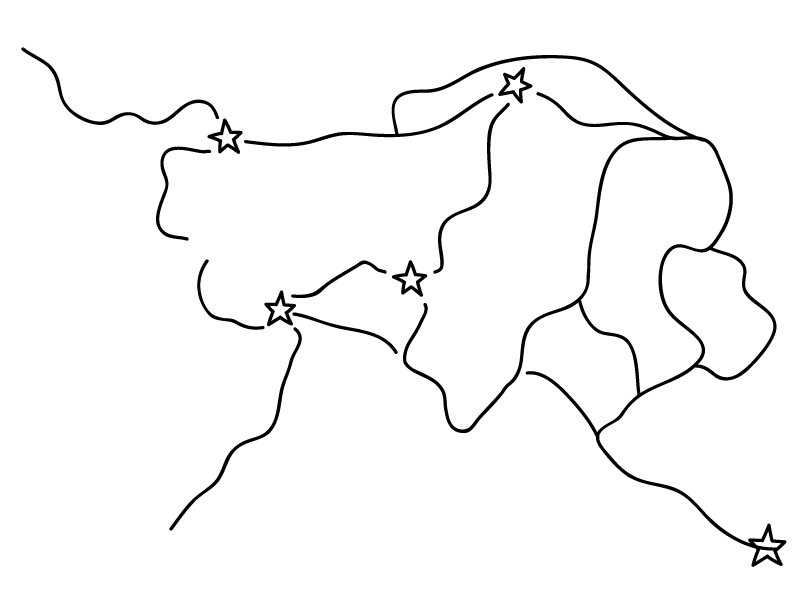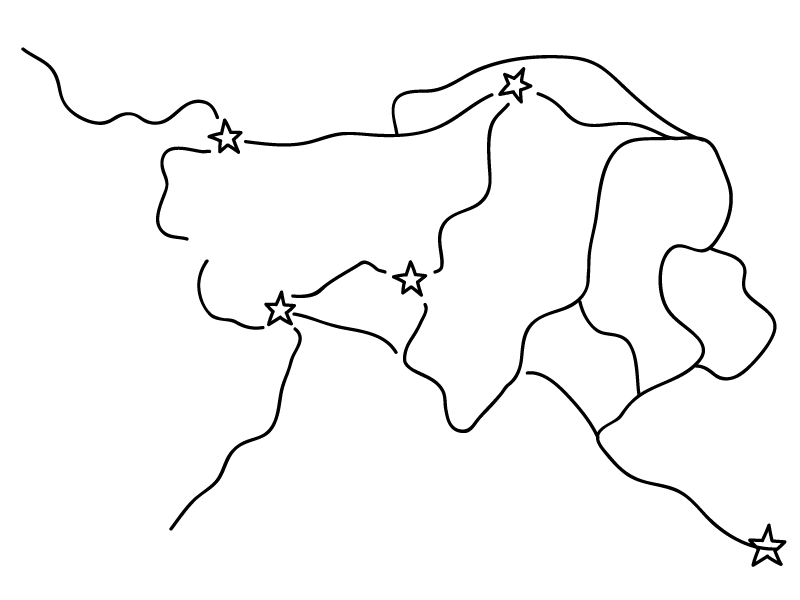Verbatim
When it comes to infinite piles of money with potential to profoundly reshape the geopolitical landscape, there are few so sketchily understood as the nebulous Belt and Road Initiative, China’s grand, decades-long plan to rebuild the Silk Road at any cost by land, sea, and ice. There’s been frustratingly little in-depth English language reporting to date on what it will actually mean on the ground for those who it will most immediately effect – the residents of the troubled Central Asian states through which the old Silk Road once ran and which the new one also must. Ben Mauk’s “Nowhere”, a long NYT Mag feature centered around a remote Kazakh village not far from the Chinese border, is a good first step, and a great way in to a story with a deeply complex web of implications.
The ancient Silk Road was equal parts trade route and social network. The routes themselves were in constant flux and administered by no one, and they succeeded through incremental growth and local knowledge in response to changing needs — the exact opposite of the Ozymandian ambitions and sweeping autocratic statecraft that characterize the Belt and Road. For all its potential to create jobs and modernize infrastructures, the project has also created a halo of mass internment camps for the powerless and gray-market economies for the poor. While new official jobs in Khorgos are lifting a lucky few out of poverty, it is far more common to find farmers and herders moonlighting as taxi drivers, security guards or smugglers, part of a precarious network of low-paid freelancers. Such work is susceptible by design to sudden changes in enforcement and depends on a constant influx of disposable workers. It seemed like a high cost for connecting the world.

ThingsWhatever’s going on at Davos this year, it’s fun to watch from the sidelines. We’ve talked here before about Anand Giridharadas’s broadside against philanthrocapitalism, Winner Take All, but this Economist review – published just as this year’s event was clearly beginning to draw more attention for the traction his arguments and others of a similar persuasion like that Dutch historian and that kid were gaining than for any new bold initiatives from the ultrarich – is worth reading, if only for their surprising wish that he push his argument even further.
We were wondering just the other day if finishing schools were still a thing that existed. Perhaps not, but maybe because everything’s gotten so crushing and confusing that what we really need are adulting schools?
Utopian dreaming in our civic infrastructure. At e-flux, Molly Sauter ponders the imaginary lands brought forth by Sidewalk Labs’s conceptual plans for a corner of Toronto built on the “extractive data-labor of residents”. Sauter applies the art critic’s eye to its concept sketches for a likely-never-to-be-realised-in-this-form-but-inevitable-in-another smart city powered and funded by a rich seam of lucrative data from those who move through it. There’s a long and playful tradition of overly serious analysis of developers’ concept sketches that we’ve always been a sucker for – this one is fun.

Even if you’re not a fan of his movies, there’s something fascinating about those interviews with Steven Soderbergh where he decides to speak frankly and wonkily about how his industry actually works. Over an odd but super interesting 30-year career, Soderbergh has used his privilege to experiment and tweak tiny variables of the day to day, learning how things change each time, and then not just adapting, but trying something completely different to learn a different thing. Sure, he’s left a trail of bad-to-decent-to-good-to-great work, but it’s the data set that’s almost more valuable in the long run. This great, and loooong, conversation with Deadline at Slamdance dives into the brass tacks of what he’s learned about how the creative industry really works in the age of streaming and, more broadly, how the reality of the importance of things like influencer culture doesn’t return in kind, or match up to the breathless enthusiasm we give it.
We’re moving quickly from brand virtue signalling to corporate cancel culture. Gillette and Nike have shown that brands can be rewarded for taking on progressive causes through serious, cinematic advertisements. But as brands pile on, companies will have to stand out by calling-out each other’s bad practice. Apple has done just that to Facebook, which was paying teens to download a research app that used root device access to track user behaviour beyond the Facebook environment. Apple’s crackdown disabled the research app along with Facebook’s suite of employee apps, disrupting Facebook’s operations. The walled gardens are becoming fortified kingdoms.

We have a very curated corner of our podcast list that we lovingly fill with weirdo white noise and sound experiments – background whatevers that settle the brain down a level or two. So we’re pretty happy about this one cooked up by one of BS’s very favourite and most linked writers, Jon Mooallem, called Walking – which is literally just that. The sound of a good person trudging, trying to walk off a stressy situation, interrupted only by the occasional surprise ad read. It does inspire Patrick to want to do a podcast of all the times he left his audio recorder going in his pocket – you’d subscribe, right?

Those are the headlines. God I wish they weren’t. This week’s oral history is of The Day Today, not just the birthplace of Alan Partridge but also one of the greatest and perhaps most prescient TV comedies of all time. Not to end with a lazy “we’ve moved beyond satire” take, but really, what could a version of this show possibly look like today?
“Sooner or later, it’s all destined for the bird cage. But all these publications that rose and fell, at least they gave some people some jobs for a while.” For Choire Sicha’s final “Work Friend” column at the Times, an elegy for the good and great publishing we lost along the way.
There’s been a bunch of new subscribers these past few weeks. Since, by virtue of having no plan, we rarely tell anybody about this here email, we got to wondering where y’all hail from? You’d make us and our extremely analogue analytics engine happy if you’d reply and let us know who pointed you here! Otherwise we just presume we’re writing to entertain a botnet, which is totally fine.





